Reflective Journal: Applying Entrepreneurship Theories in Practice
VerifiedAdded on 2022/08/30
|11
|2189
|17
Journal and Reflective Writing
AI Summary
This reflective journal, a student's assignment for a business management and entrepreneurship course (BUS302), delves into the complexities of entrepreneurship. The student reflects on key concepts such as innovation, the triple bottom line, and the dynamics of startups, drawing from course lectures and independent study. The journal explores how entrepreneurship is a learned discipline, emphasizing innovation as a key driver. It examines the triple bottom line's role in sustainable entrepreneurship and the importance of internal and external environmental analysis. Furthermore, it discusses the significance of innovation in the hospitality industry and the application of entrepreneurial skills, offering insights into analyzing new ventures. The student concludes by expressing confidence in applying these theories to future business endeavors, providing a valuable perspective on the course's impact.

RUNNING HEAD: REFLECTIVE JOURNAL
Name of Student:
Name of University;
Author Note:
Name of Student:
Name of University;
Author Note:
Paraphrase This Document
Need a fresh take? Get an instant paraphrase of this document with our AI Paraphraser
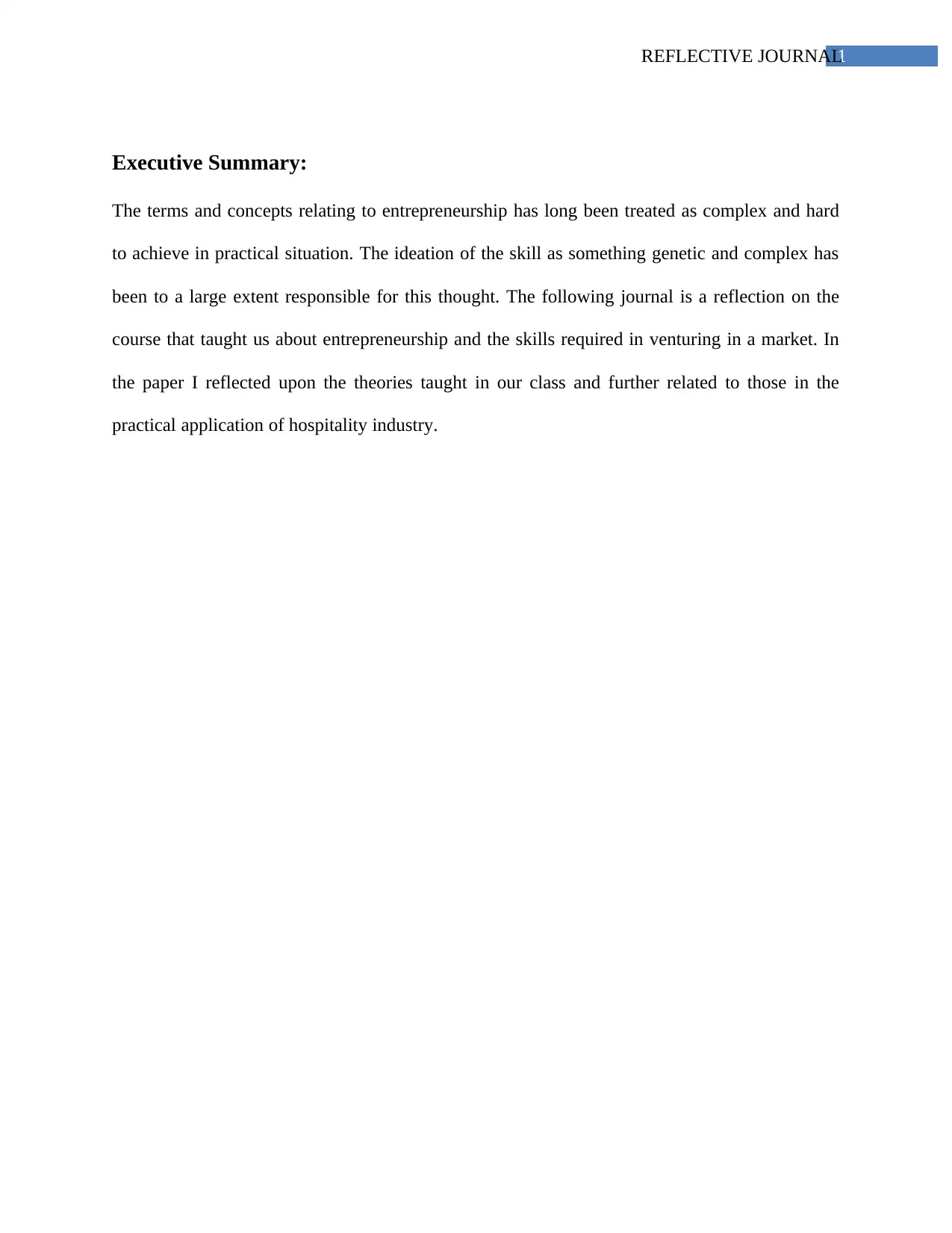
1REFLECTIVE JOURNAL
Executive Summary:
The terms and concepts relating to entrepreneurship has long been treated as complex and hard
to achieve in practical situation. The ideation of the skill as something genetic and complex has
been to a large extent responsible for this thought. The following journal is a reflection on the
course that taught us about entrepreneurship and the skills required in venturing in a market. In
the paper I reflected upon the theories taught in our class and further related to those in the
practical application of hospitality industry.
Executive Summary:
The terms and concepts relating to entrepreneurship has long been treated as complex and hard
to achieve in practical situation. The ideation of the skill as something genetic and complex has
been to a large extent responsible for this thought. The following journal is a reflection on the
course that taught us about entrepreneurship and the skills required in venturing in a market. In
the paper I reflected upon the theories taught in our class and further related to those in the
practical application of hospitality industry.
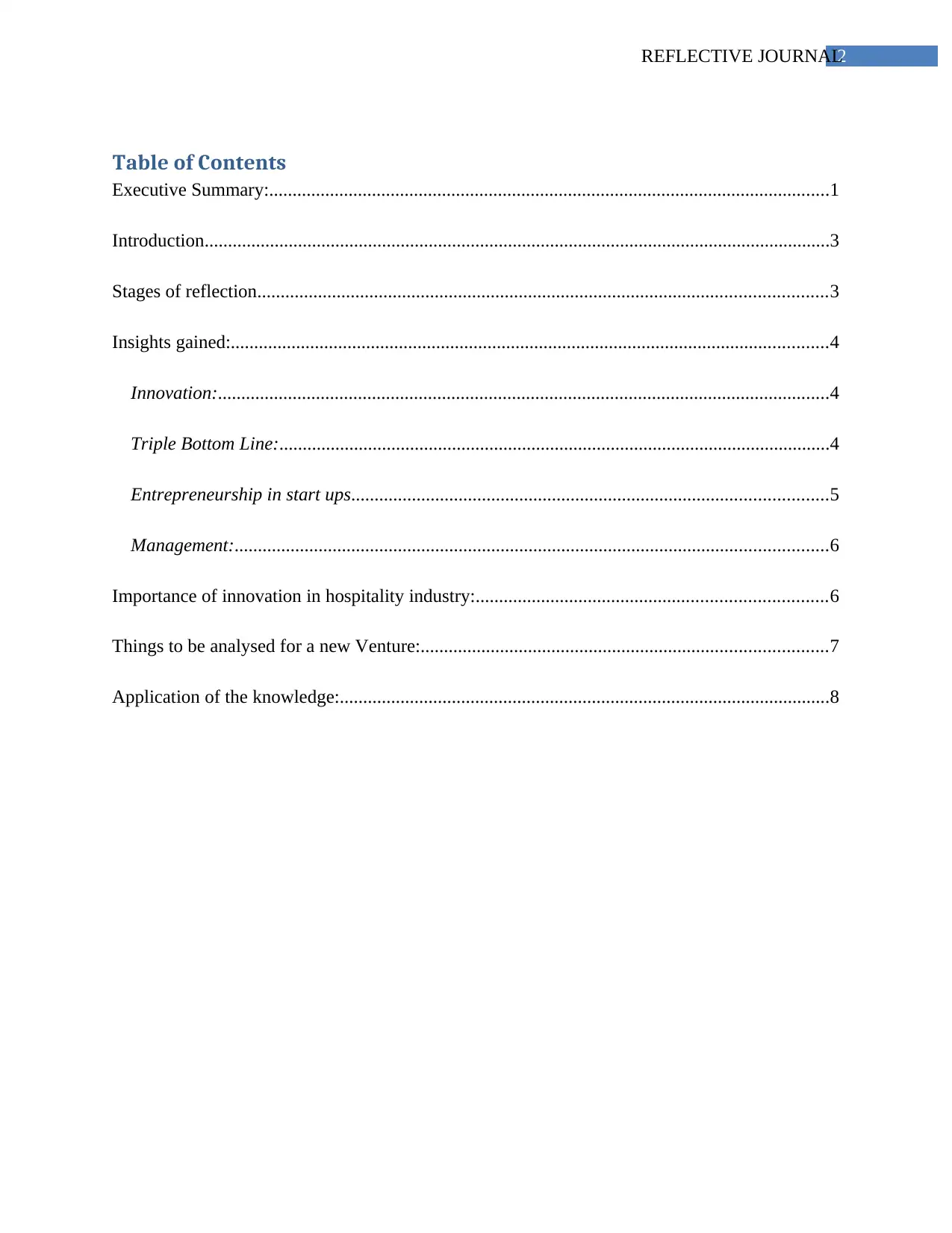
2REFLECTIVE JOURNAL
Table of Contents
Executive Summary:........................................................................................................................1
Introduction......................................................................................................................................3
Stages of reflection..........................................................................................................................3
Insights gained:................................................................................................................................4
Innovation:...................................................................................................................................4
Triple Bottom Line:......................................................................................................................4
Entrepreneurship in start ups......................................................................................................5
Management:...............................................................................................................................6
Importance of innovation in hospitality industry:...........................................................................6
Things to be analysed for a new Venture:.......................................................................................7
Application of the knowledge:.........................................................................................................8
Table of Contents
Executive Summary:........................................................................................................................1
Introduction......................................................................................................................................3
Stages of reflection..........................................................................................................................3
Insights gained:................................................................................................................................4
Innovation:...................................................................................................................................4
Triple Bottom Line:......................................................................................................................4
Entrepreneurship in start ups......................................................................................................5
Management:...............................................................................................................................6
Importance of innovation in hospitality industry:...........................................................................6
Things to be analysed for a new Venture:.......................................................................................7
Application of the knowledge:.........................................................................................................8
⊘ This is a preview!⊘
Do you want full access?
Subscribe today to unlock all pages.

Trusted by 1+ million students worldwide
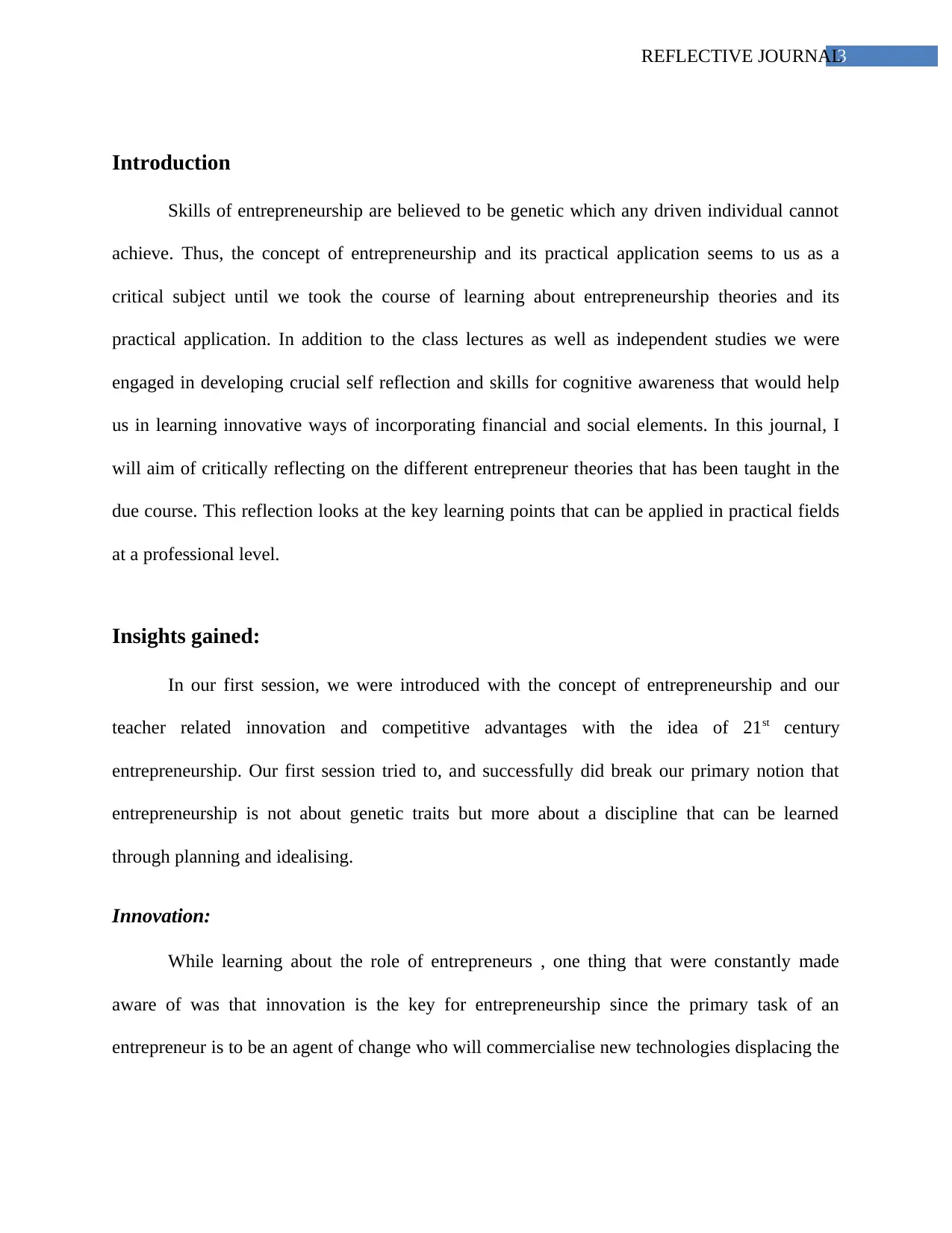
3REFLECTIVE JOURNAL
Introduction
Skills of entrepreneurship are believed to be genetic which any driven individual cannot
achieve. Thus, the concept of entrepreneurship and its practical application seems to us as a
critical subject until we took the course of learning about entrepreneurship theories and its
practical application. In addition to the class lectures as well as independent studies we were
engaged in developing crucial self reflection and skills for cognitive awareness that would help
us in learning innovative ways of incorporating financial and social elements. In this journal, I
will aim of critically reflecting on the different entrepreneur theories that has been taught in the
due course. This reflection looks at the key learning points that can be applied in practical fields
at a professional level.
Insights gained:
In our first session, we were introduced with the concept of entrepreneurship and our
teacher related innovation and competitive advantages with the idea of 21st century
entrepreneurship. Our first session tried to, and successfully did break our primary notion that
entrepreneurship is not about genetic traits but more about a discipline that can be learned
through planning and idealising.
Innovation:
While learning about the role of entrepreneurs , one thing that were constantly made
aware of was that innovation is the key for entrepreneurship since the primary task of an
entrepreneur is to be an agent of change who will commercialise new technologies displacing the
Introduction
Skills of entrepreneurship are believed to be genetic which any driven individual cannot
achieve. Thus, the concept of entrepreneurship and its practical application seems to us as a
critical subject until we took the course of learning about entrepreneurship theories and its
practical application. In addition to the class lectures as well as independent studies we were
engaged in developing crucial self reflection and skills for cognitive awareness that would help
us in learning innovative ways of incorporating financial and social elements. In this journal, I
will aim of critically reflecting on the different entrepreneur theories that has been taught in the
due course. This reflection looks at the key learning points that can be applied in practical fields
at a professional level.
Insights gained:
In our first session, we were introduced with the concept of entrepreneurship and our
teacher related innovation and competitive advantages with the idea of 21st century
entrepreneurship. Our first session tried to, and successfully did break our primary notion that
entrepreneurship is not about genetic traits but more about a discipline that can be learned
through planning and idealising.
Innovation:
While learning about the role of entrepreneurs , one thing that were constantly made
aware of was that innovation is the key for entrepreneurship since the primary task of an
entrepreneur is to be an agent of change who will commercialise new technologies displacing the
Paraphrase This Document
Need a fresh take? Get an instant paraphrase of this document with our AI Paraphraser
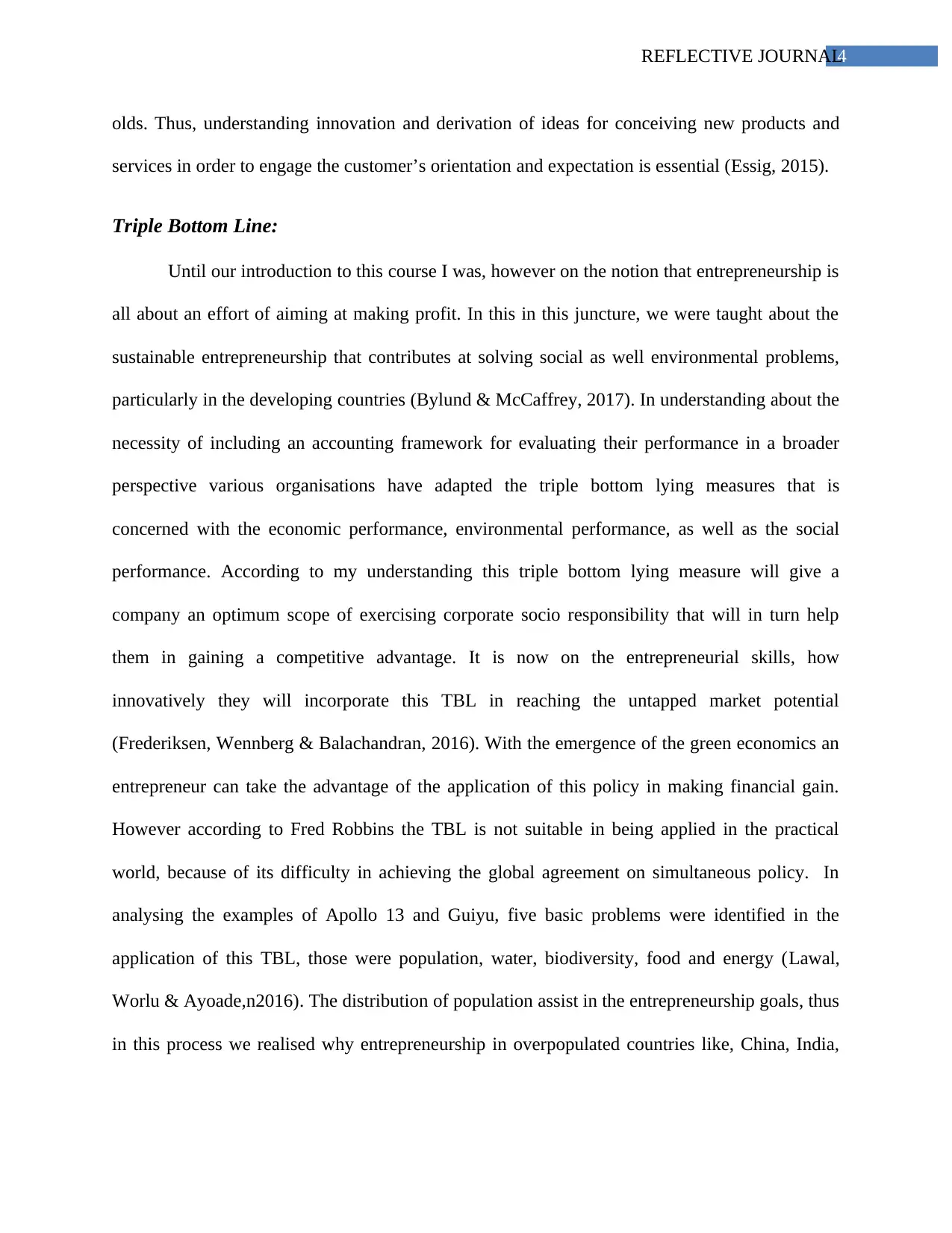
4REFLECTIVE JOURNAL
olds. Thus, understanding innovation and derivation of ideas for conceiving new products and
services in order to engage the customer’s orientation and expectation is essential (Essig, 2015).
Triple Bottom Line:
Until our introduction to this course I was, however on the notion that entrepreneurship is
all about an effort of aiming at making profit. In this in this juncture, we were taught about the
sustainable entrepreneurship that contributes at solving social as well environmental problems,
particularly in the developing countries (Bylund & McCaffrey, 2017). In understanding about the
necessity of including an accounting framework for evaluating their performance in a broader
perspective various organisations have adapted the triple bottom lying measures that is
concerned with the economic performance, environmental performance, as well as the social
performance. According to my understanding this triple bottom lying measure will give a
company an optimum scope of exercising corporate socio responsibility that will in turn help
them in gaining a competitive advantage. It is now on the entrepreneurial skills, how
innovatively they will incorporate this TBL in reaching the untapped market potential
(Frederiksen, Wennberg & Balachandran, 2016). With the emergence of the green economics an
entrepreneur can take the advantage of the application of this policy in making financial gain.
However according to Fred Robbins the TBL is not suitable in being applied in the practical
world, because of its difficulty in achieving the global agreement on simultaneous policy. In
analysing the examples of Apollo 13 and Guiyu, five basic problems were identified in the
application of this TBL, those were population, water, biodiversity, food and energy (Lawal,
Worlu & Ayoade,n2016). The distribution of population assist in the entrepreneurship goals, thus
in this process we realised why entrepreneurship in overpopulated countries like, China, India,
olds. Thus, understanding innovation and derivation of ideas for conceiving new products and
services in order to engage the customer’s orientation and expectation is essential (Essig, 2015).
Triple Bottom Line:
Until our introduction to this course I was, however on the notion that entrepreneurship is
all about an effort of aiming at making profit. In this in this juncture, we were taught about the
sustainable entrepreneurship that contributes at solving social as well environmental problems,
particularly in the developing countries (Bylund & McCaffrey, 2017). In understanding about the
necessity of including an accounting framework for evaluating their performance in a broader
perspective various organisations have adapted the triple bottom lying measures that is
concerned with the economic performance, environmental performance, as well as the social
performance. According to my understanding this triple bottom lying measure will give a
company an optimum scope of exercising corporate socio responsibility that will in turn help
them in gaining a competitive advantage. It is now on the entrepreneurial skills, how
innovatively they will incorporate this TBL in reaching the untapped market potential
(Frederiksen, Wennberg & Balachandran, 2016). With the emergence of the green economics an
entrepreneur can take the advantage of the application of this policy in making financial gain.
However according to Fred Robbins the TBL is not suitable in being applied in the practical
world, because of its difficulty in achieving the global agreement on simultaneous policy. In
analysing the examples of Apollo 13 and Guiyu, five basic problems were identified in the
application of this TBL, those were population, water, biodiversity, food and energy (Lawal,
Worlu & Ayoade,n2016). The distribution of population assist in the entrepreneurship goals, thus
in this process we realised why entrepreneurship in overpopulated countries like, China, India,
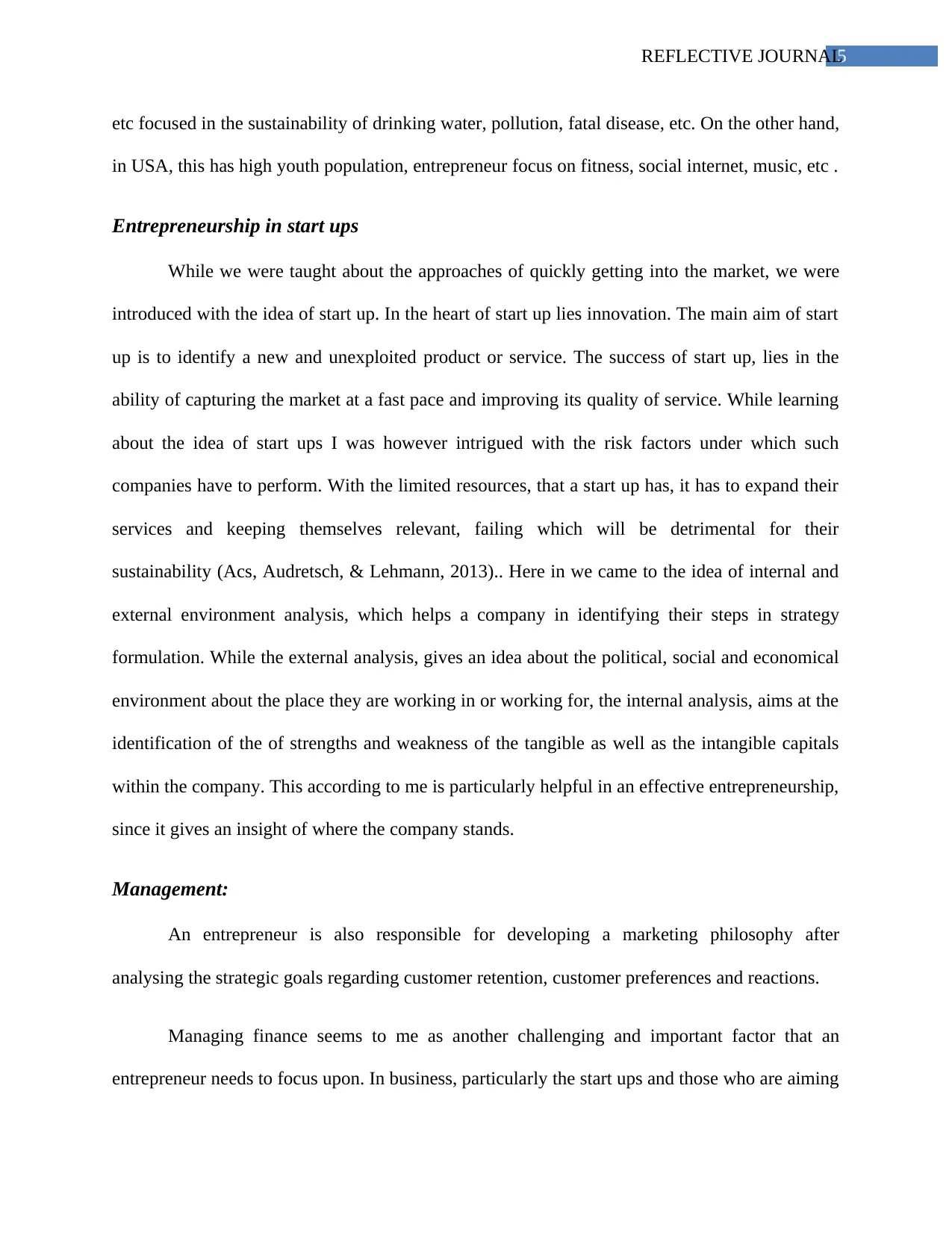
5REFLECTIVE JOURNAL
etc focused in the sustainability of drinking water, pollution, fatal disease, etc. On the other hand,
in USA, this has high youth population, entrepreneur focus on fitness, social internet, music, etc .
Entrepreneurship in start ups
While we were taught about the approaches of quickly getting into the market, we were
introduced with the idea of start up. In the heart of start up lies innovation. The main aim of start
up is to identify a new and unexploited product or service. The success of start up, lies in the
ability of capturing the market at a fast pace and improving its quality of service. While learning
about the idea of start ups I was however intrigued with the risk factors under which such
companies have to perform. With the limited resources, that a start up has, it has to expand their
services and keeping themselves relevant, failing which will be detrimental for their
sustainability (Acs, Audretsch, & Lehmann, 2013).. Here in we came to the idea of internal and
external environment analysis, which helps a company in identifying their steps in strategy
formulation. While the external analysis, gives an idea about the political, social and economical
environment about the place they are working in or working for, the internal analysis, aims at the
identification of the of strengths and weakness of the tangible as well as the intangible capitals
within the company. This according to me is particularly helpful in an effective entrepreneurship,
since it gives an insight of where the company stands.
Management:
An entrepreneur is also responsible for developing a marketing philosophy after
analysing the strategic goals regarding customer retention, customer preferences and reactions.
Managing finance seems to me as another challenging and important factor that an
entrepreneur needs to focus upon. In business, particularly the start ups and those who are aiming
etc focused in the sustainability of drinking water, pollution, fatal disease, etc. On the other hand,
in USA, this has high youth population, entrepreneur focus on fitness, social internet, music, etc .
Entrepreneurship in start ups
While we were taught about the approaches of quickly getting into the market, we were
introduced with the idea of start up. In the heart of start up lies innovation. The main aim of start
up is to identify a new and unexploited product or service. The success of start up, lies in the
ability of capturing the market at a fast pace and improving its quality of service. While learning
about the idea of start ups I was however intrigued with the risk factors under which such
companies have to perform. With the limited resources, that a start up has, it has to expand their
services and keeping themselves relevant, failing which will be detrimental for their
sustainability (Acs, Audretsch, & Lehmann, 2013).. Here in we came to the idea of internal and
external environment analysis, which helps a company in identifying their steps in strategy
formulation. While the external analysis, gives an idea about the political, social and economical
environment about the place they are working in or working for, the internal analysis, aims at the
identification of the of strengths and weakness of the tangible as well as the intangible capitals
within the company. This according to me is particularly helpful in an effective entrepreneurship,
since it gives an insight of where the company stands.
Management:
An entrepreneur is also responsible for developing a marketing philosophy after
analysing the strategic goals regarding customer retention, customer preferences and reactions.
Managing finance seems to me as another challenging and important factor that an
entrepreneur needs to focus upon. In business, particularly the start ups and those who are aiming
⊘ This is a preview!⊘
Do you want full access?
Subscribe today to unlock all pages.

Trusted by 1+ million students worldwide
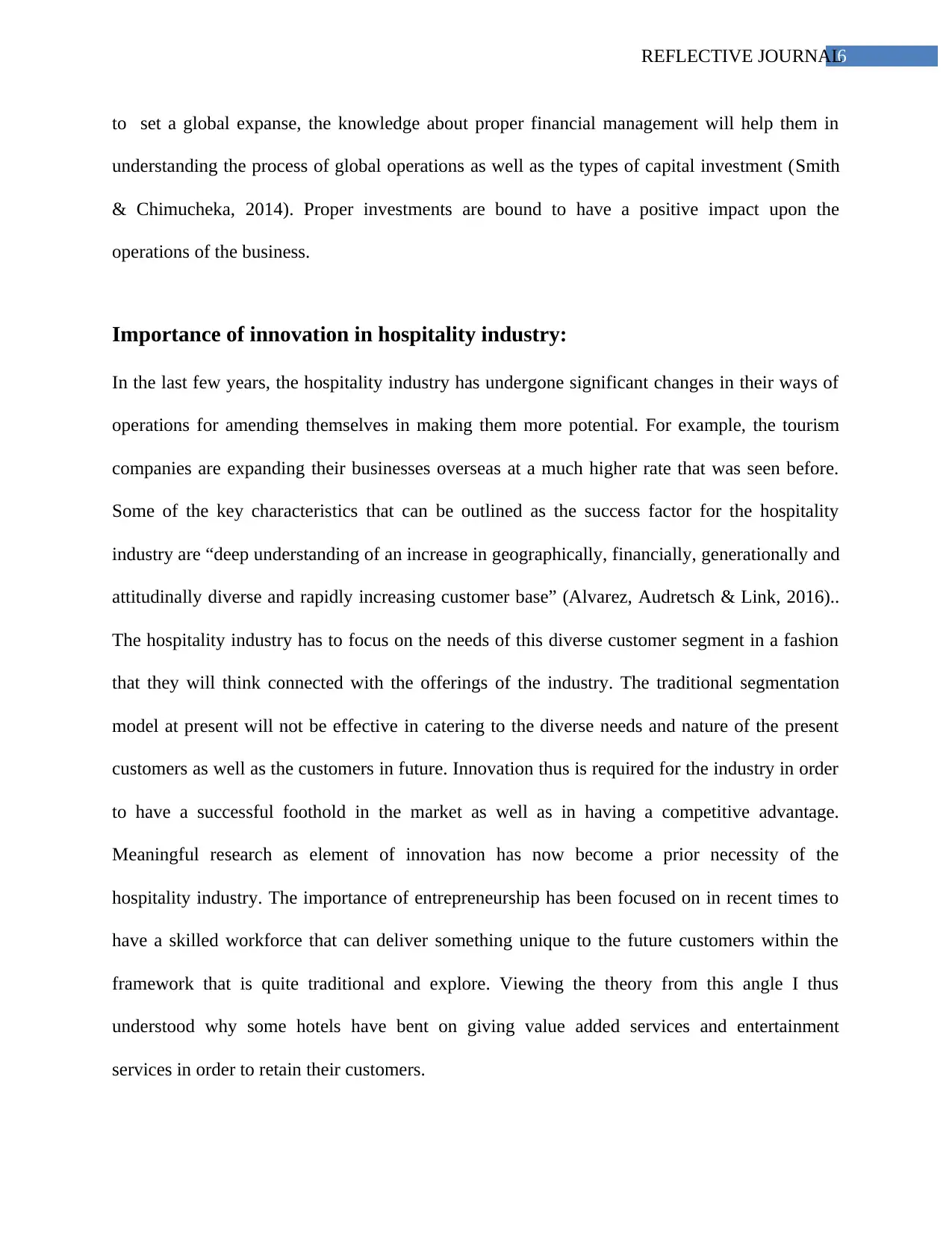
6REFLECTIVE JOURNAL
to set a global expanse, the knowledge about proper financial management will help them in
understanding the process of global operations as well as the types of capital investment (Smith
& Chimucheka, 2014). Proper investments are bound to have a positive impact upon the
operations of the business.
Importance of innovation in hospitality industry:
In the last few years, the hospitality industry has undergone significant changes in their ways of
operations for amending themselves in making them more potential. For example, the tourism
companies are expanding their businesses overseas at a much higher rate that was seen before.
Some of the key characteristics that can be outlined as the success factor for the hospitality
industry are “deep understanding of an increase in geographically, financially, generationally and
attitudinally diverse and rapidly increasing customer base” (Alvarez, Audretsch & Link, 2016)..
The hospitality industry has to focus on the needs of this diverse customer segment in a fashion
that they will think connected with the offerings of the industry. The traditional segmentation
model at present will not be effective in catering to the diverse needs and nature of the present
customers as well as the customers in future. Innovation thus is required for the industry in order
to have a successful foothold in the market as well as in having a competitive advantage.
Meaningful research as element of innovation has now become a prior necessity of the
hospitality industry. The importance of entrepreneurship has been focused on in recent times to
have a skilled workforce that can deliver something unique to the future customers within the
framework that is quite traditional and explore. Viewing the theory from this angle I thus
understood why some hotels have bent on giving value added services and entertainment
services in order to retain their customers.
to set a global expanse, the knowledge about proper financial management will help them in
understanding the process of global operations as well as the types of capital investment (Smith
& Chimucheka, 2014). Proper investments are bound to have a positive impact upon the
operations of the business.
Importance of innovation in hospitality industry:
In the last few years, the hospitality industry has undergone significant changes in their ways of
operations for amending themselves in making them more potential. For example, the tourism
companies are expanding their businesses overseas at a much higher rate that was seen before.
Some of the key characteristics that can be outlined as the success factor for the hospitality
industry are “deep understanding of an increase in geographically, financially, generationally and
attitudinally diverse and rapidly increasing customer base” (Alvarez, Audretsch & Link, 2016)..
The hospitality industry has to focus on the needs of this diverse customer segment in a fashion
that they will think connected with the offerings of the industry. The traditional segmentation
model at present will not be effective in catering to the diverse needs and nature of the present
customers as well as the customers in future. Innovation thus is required for the industry in order
to have a successful foothold in the market as well as in having a competitive advantage.
Meaningful research as element of innovation has now become a prior necessity of the
hospitality industry. The importance of entrepreneurship has been focused on in recent times to
have a skilled workforce that can deliver something unique to the future customers within the
framework that is quite traditional and explore. Viewing the theory from this angle I thus
understood why some hotels have bent on giving value added services and entertainment
services in order to retain their customers.
Paraphrase This Document
Need a fresh take? Get an instant paraphrase of this document with our AI Paraphraser
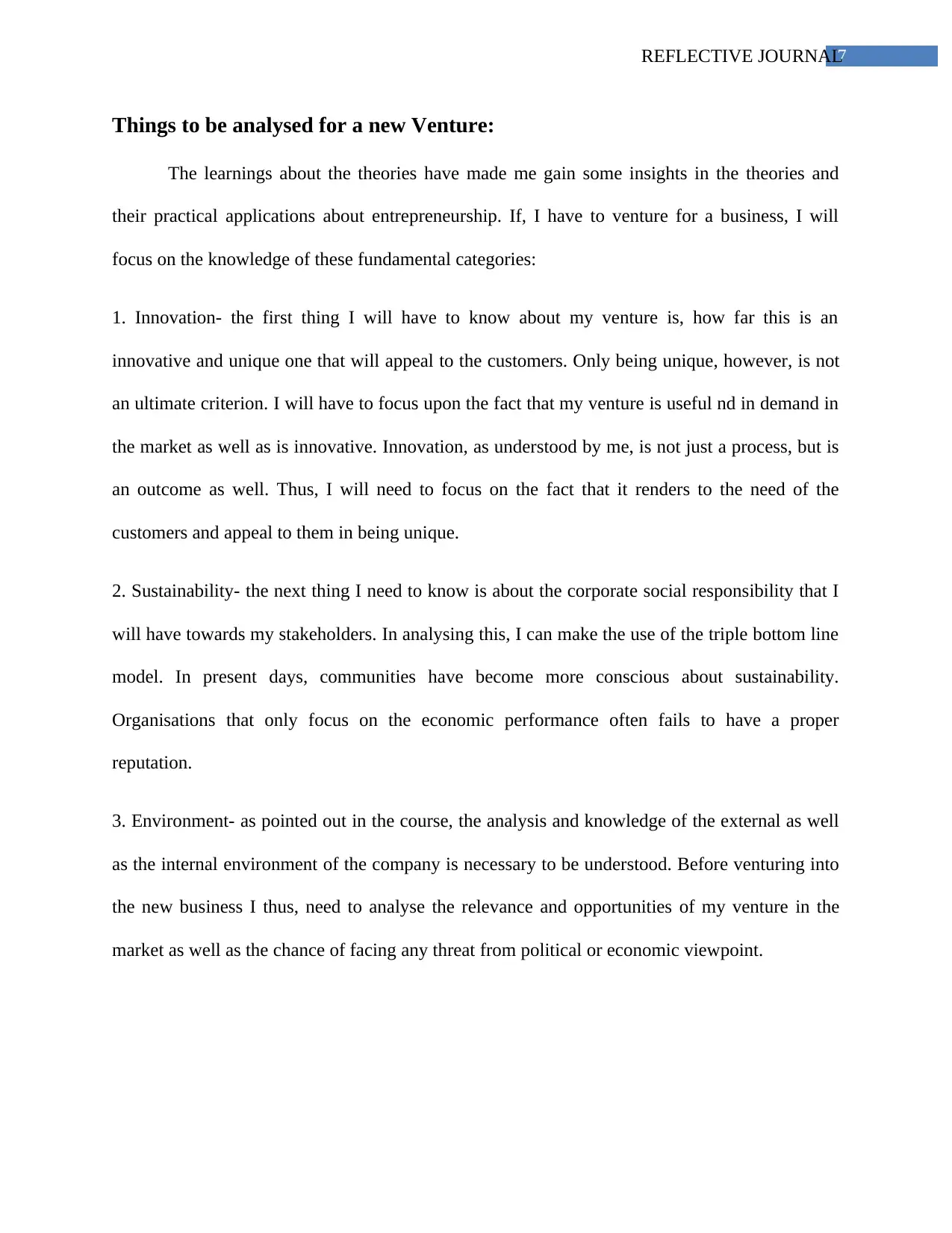
7REFLECTIVE JOURNAL
Things to be analysed for a new Venture:
The learnings about the theories have made me gain some insights in the theories and
their practical applications about entrepreneurship. If, I have to venture for a business, I will
focus on the knowledge of these fundamental categories:
1. Innovation- the first thing I will have to know about my venture is, how far this is an
innovative and unique one that will appeal to the customers. Only being unique, however, is not
an ultimate criterion. I will have to focus upon the fact that my venture is useful nd in demand in
the market as well as is innovative. Innovation, as understood by me, is not just a process, but is
an outcome as well. Thus, I will need to focus on the fact that it renders to the need of the
customers and appeal to them in being unique.
2. Sustainability- the next thing I need to know is about the corporate social responsibility that I
will have towards my stakeholders. In analysing this, I can make the use of the triple bottom line
model. In present days, communities have become more conscious about sustainability.
Organisations that only focus on the economic performance often fails to have a proper
reputation.
3. Environment- as pointed out in the course, the analysis and knowledge of the external as well
as the internal environment of the company is necessary to be understood. Before venturing into
the new business I thus, need to analyse the relevance and opportunities of my venture in the
market as well as the chance of facing any threat from political or economic viewpoint.
Things to be analysed for a new Venture:
The learnings about the theories have made me gain some insights in the theories and
their practical applications about entrepreneurship. If, I have to venture for a business, I will
focus on the knowledge of these fundamental categories:
1. Innovation- the first thing I will have to know about my venture is, how far this is an
innovative and unique one that will appeal to the customers. Only being unique, however, is not
an ultimate criterion. I will have to focus upon the fact that my venture is useful nd in demand in
the market as well as is innovative. Innovation, as understood by me, is not just a process, but is
an outcome as well. Thus, I will need to focus on the fact that it renders to the need of the
customers and appeal to them in being unique.
2. Sustainability- the next thing I need to know is about the corporate social responsibility that I
will have towards my stakeholders. In analysing this, I can make the use of the triple bottom line
model. In present days, communities have become more conscious about sustainability.
Organisations that only focus on the economic performance often fails to have a proper
reputation.
3. Environment- as pointed out in the course, the analysis and knowledge of the external as well
as the internal environment of the company is necessary to be understood. Before venturing into
the new business I thus, need to analyse the relevance and opportunities of my venture in the
market as well as the chance of facing any threat from political or economic viewpoint.
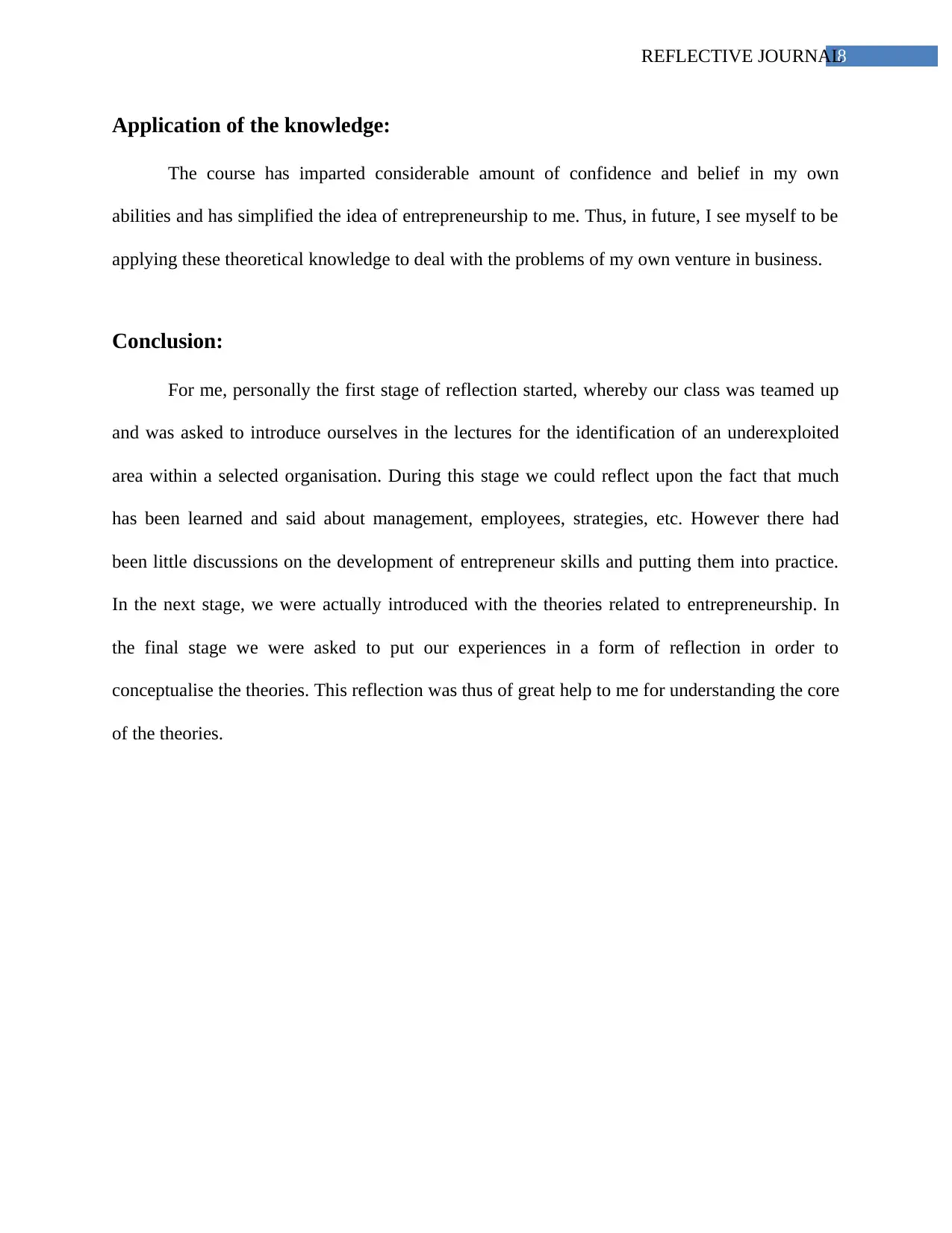
8REFLECTIVE JOURNAL
Application of the knowledge:
The course has imparted considerable amount of confidence and belief in my own
abilities and has simplified the idea of entrepreneurship to me. Thus, in future, I see myself to be
applying these theoretical knowledge to deal with the problems of my own venture in business.
Conclusion:
For me, personally the first stage of reflection started, whereby our class was teamed up
and was asked to introduce ourselves in the lectures for the identification of an underexploited
area within a selected organisation. During this stage we could reflect upon the fact that much
has been learned and said about management, employees, strategies, etc. However there had
been little discussions on the development of entrepreneur skills and putting them into practice.
In the next stage, we were actually introduced with the theories related to entrepreneurship. In
the final stage we were asked to put our experiences in a form of reflection in order to
conceptualise the theories. This reflection was thus of great help to me for understanding the core
of the theories.
Application of the knowledge:
The course has imparted considerable amount of confidence and belief in my own
abilities and has simplified the idea of entrepreneurship to me. Thus, in future, I see myself to be
applying these theoretical knowledge to deal with the problems of my own venture in business.
Conclusion:
For me, personally the first stage of reflection started, whereby our class was teamed up
and was asked to introduce ourselves in the lectures for the identification of an underexploited
area within a selected organisation. During this stage we could reflect upon the fact that much
has been learned and said about management, employees, strategies, etc. However there had
been little discussions on the development of entrepreneur skills and putting them into practice.
In the next stage, we were actually introduced with the theories related to entrepreneurship. In
the final stage we were asked to put our experiences in a form of reflection in order to
conceptualise the theories. This reflection was thus of great help to me for understanding the core
of the theories.
⊘ This is a preview!⊘
Do you want full access?
Subscribe today to unlock all pages.

Trusted by 1+ million students worldwide
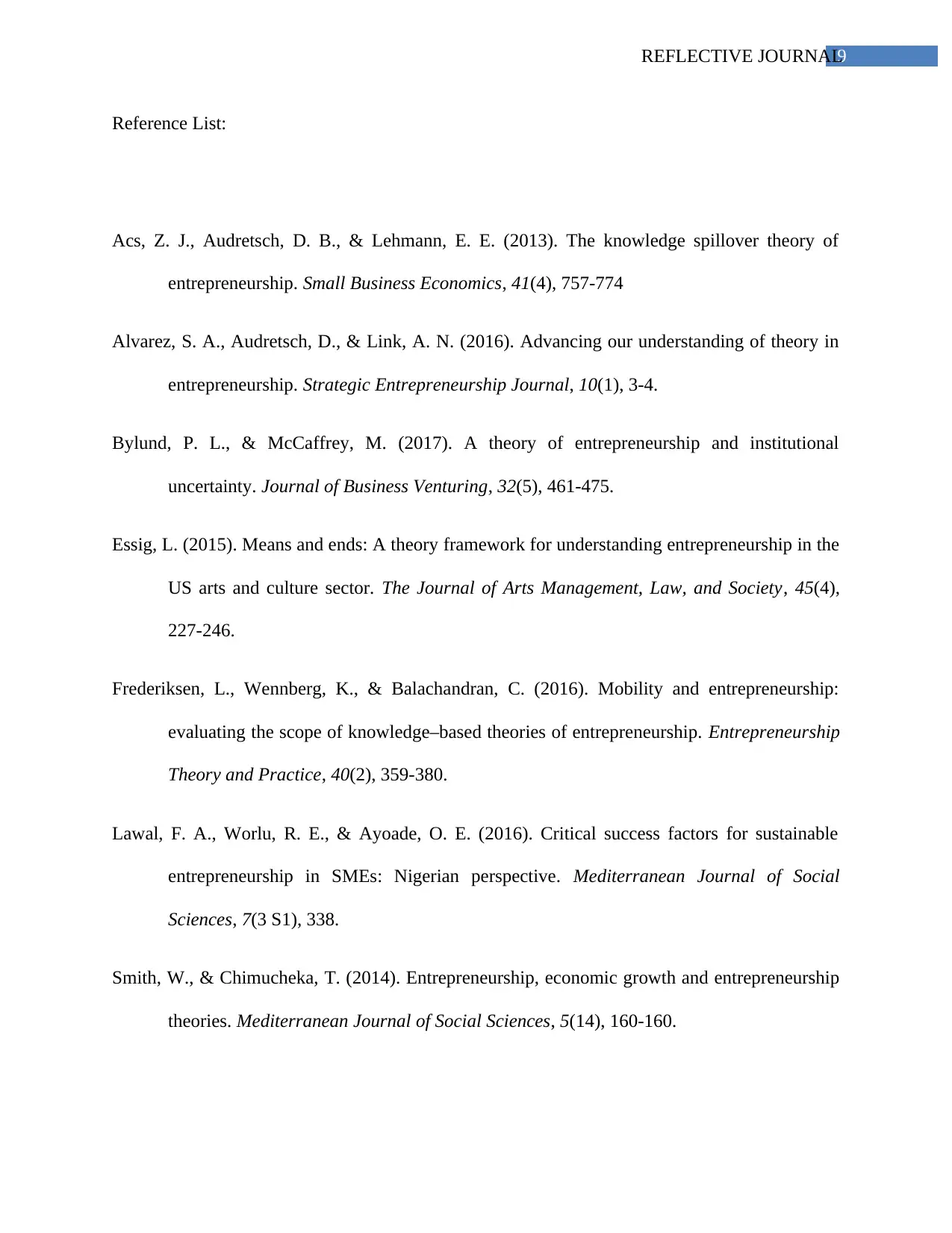
9REFLECTIVE JOURNAL
Reference List:
Acs, Z. J., Audretsch, D. B., & Lehmann, E. E. (2013). The knowledge spillover theory of
entrepreneurship. Small Business Economics, 41(4), 757-774
Alvarez, S. A., Audretsch, D., & Link, A. N. (2016). Advancing our understanding of theory in
entrepreneurship. Strategic Entrepreneurship Journal, 10(1), 3-4.
Bylund, P. L., & McCaffrey, M. (2017). A theory of entrepreneurship and institutional
uncertainty. Journal of Business Venturing, 32(5), 461-475.
Essig, L. (2015). Means and ends: A theory framework for understanding entrepreneurship in the
US arts and culture sector. The Journal of Arts Management, Law, and Society, 45(4),
227-246.
Frederiksen, L., Wennberg, K., & Balachandran, C. (2016). Mobility and entrepreneurship:
evaluating the scope of knowledge–based theories of entrepreneurship. Entrepreneurship
Theory and Practice, 40(2), 359-380.
Lawal, F. A., Worlu, R. E., & Ayoade, O. E. (2016). Critical success factors for sustainable
entrepreneurship in SMEs: Nigerian perspective. Mediterranean Journal of Social
Sciences, 7(3 S1), 338.
Smith, W., & Chimucheka, T. (2014). Entrepreneurship, economic growth and entrepreneurship
theories. Mediterranean Journal of Social Sciences, 5(14), 160-160.
Reference List:
Acs, Z. J., Audretsch, D. B., & Lehmann, E. E. (2013). The knowledge spillover theory of
entrepreneurship. Small Business Economics, 41(4), 757-774
Alvarez, S. A., Audretsch, D., & Link, A. N. (2016). Advancing our understanding of theory in
entrepreneurship. Strategic Entrepreneurship Journal, 10(1), 3-4.
Bylund, P. L., & McCaffrey, M. (2017). A theory of entrepreneurship and institutional
uncertainty. Journal of Business Venturing, 32(5), 461-475.
Essig, L. (2015). Means and ends: A theory framework for understanding entrepreneurship in the
US arts and culture sector. The Journal of Arts Management, Law, and Society, 45(4),
227-246.
Frederiksen, L., Wennberg, K., & Balachandran, C. (2016). Mobility and entrepreneurship:
evaluating the scope of knowledge–based theories of entrepreneurship. Entrepreneurship
Theory and Practice, 40(2), 359-380.
Lawal, F. A., Worlu, R. E., & Ayoade, O. E. (2016). Critical success factors for sustainable
entrepreneurship in SMEs: Nigerian perspective. Mediterranean Journal of Social
Sciences, 7(3 S1), 338.
Smith, W., & Chimucheka, T. (2014). Entrepreneurship, economic growth and entrepreneurship
theories. Mediterranean Journal of Social Sciences, 5(14), 160-160.
Paraphrase This Document
Need a fresh take? Get an instant paraphrase of this document with our AI Paraphraser

10REFLECTIVE JOURNAL
1 out of 11
Related Documents
Your All-in-One AI-Powered Toolkit for Academic Success.
+13062052269
info@desklib.com
Available 24*7 on WhatsApp / Email
![[object Object]](/_next/static/media/star-bottom.7253800d.svg)
Unlock your academic potential
Copyright © 2020–2026 A2Z Services. All Rights Reserved. Developed and managed by ZUCOL.



